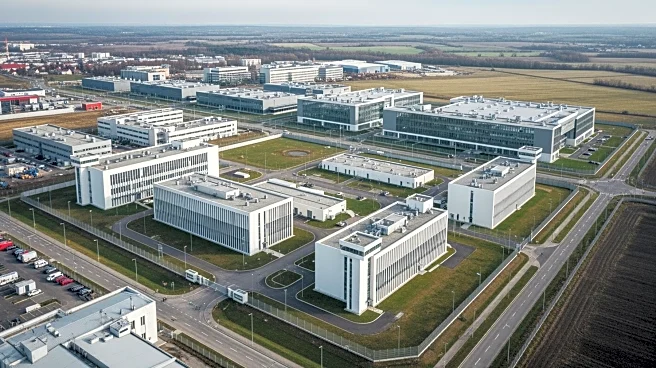What's Happening?
Major technology companies, including Amazon, Meta, Microsoft, and Google, are significantly impacting water resources in the United States due to their extensive data center operations. According to a Business Insider investigation, 40% of planned or existing
data centers are located in areas experiencing high water stress. Microsoft reported consuming nearly 2.1 billion gallons of water in 2023, marking a 22% increase from the previous year. In response to these environmental concerns, Microsoft, Amazon, Meta, and Google have pledged to become water positive by 2030. This commitment involves returning more water to the environment than they consume, with Google specifically aiming to replenish 120% of its water usage by the target year.
Why It's Important?
The expansion of data centers by tech giants poses significant challenges to water resources, particularly in regions already facing water scarcity. As these companies continue to grow their infrastructure to support AI and other technological advancements, the demand for water increases, potentially exacerbating existing environmental issues. The pledges made by these companies to become water positive by 2030 are crucial steps towards mitigating their environmental impact. However, the effectiveness of these initiatives will depend on their implementation and the ability to balance technological growth with sustainable resource management. Stakeholders, including environmental groups and local communities, are likely to closely monitor these efforts to ensure accountability and progress.
What's Next?
As tech companies work towards their water positivity goals, they may face scrutiny from environmental organizations and regulatory bodies. The success of these initiatives will require transparent reporting and innovative solutions to reduce water consumption and enhance replenishment efforts. Additionally, there may be increased pressure on these companies to invest in technologies that minimize environmental impact while supporting their operational needs. Collaboration with local governments and communities could play a vital role in achieving sustainable outcomes. The ongoing development of data centers will likely continue to influence discussions around environmental policy and resource management in the tech industry.
Beyond the Headlines
The commitment to water positivity by tech giants highlights a broader trend towards sustainability in the industry. This shift may encourage other sectors to adopt similar practices, potentially leading to widespread changes in corporate environmental responsibility. Furthermore, the focus on water resources could drive innovation in water conservation technologies, benefiting both the tech industry and society at large. The ethical implications of resource consumption by large corporations may also spark debates on corporate accountability and the balance between technological advancement and environmental stewardship.















